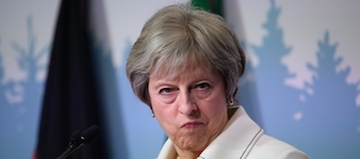The U.K. government won’t apply tariffs on most goods imported into the country in the event of a no-deal Brexit, under a temporary plan announced Wednesday.
The government also said any tariffs won’t apply to goods imported into Northern Ireland from Ireland. There will be a “temporary, unilateral approach” that wouldn’t require checks at the Irish land border.
The plan aims to offset a spike in prices that consumers would experience in a no-deal scenario as a result of the falling pound and higher costs of importing. The government called its plan a “balanced approach.”
The government document comes after Prime Minister Theresa May’s latest attempt to get her exit deal with the EU through Parliament failed. The defeat means another vote on Wednesday on a no-deal Brexit and, if that’s rejected, a further one on Thursday on whether to extend the negotiations.

The U.K. will also retain existing tariffs in areas including fuel and ceramics as a protection against “unfair global trading practices,” such as dumping.
“This is no way to run a country,” Carolyn Fairbairn, director general of the Confederation of British Industry, told the BBC. “What we are potentially going to see is this imposition of new terms of trade at the same time as business is blocked out of its closest trading partner. This is a sledgehammer for our economy.”
The rates proposed by the U.K. would be lower than currently set by the EU in many areas, ranging from 60 percent of the EU’s most-favored nation rate for poultry meat to 13 percent of the rate for cheese and pig meat. On finished cars and trucks, the U.K. would apply a 10.6 percent tariff, compared to the 11.3 percent the EU charges most-favored nations. On textiles, the U.K. would apply 0.9 percent, compared to the EU’s 8 percent. And footwear, on which the EU applies an 8.2 percent tariff, would be tariff-free into the U.K.






